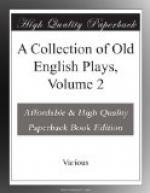...
Oh I am nought but ayre:
Had I the vigour of my former
strength
When thou beheldst me fight
at Cressy feild,
Wher hand to hand I tooke
King John of France
And his bould sonns my captive
prisoners,
Ide shake these stiff supporters
of thy bed
And dragg thee from this dull
securyty.
Oh yett for pittye wake; prevent
thy doome;
Thy blood upon my sonne will
surely come:
For which, deere brother Woodstocke,
haste and fly,
Prevent his ruein and thy
tragedy. [Exit Ghoste.
Undisturbed by this appeal, Woodstock slumbers on. Then enters the ghost of Edward the Third. His speech is worthy of Robert Greene:—
Sleepst thou so soundly and pale death so nye? Thomas of Woodstocke, wake my sone and fly. Thy wrongs have roused thy royall fathers ghost, And from his quiat grave king Edwards come To guard thy innocent life, my princely sonne. Behould me heere, sometymes faire Englands lord: (7) warlicke sonnes I left, yett being gone No one succeeded in my kingly throne, &c.
I will not inflict more of this stuff on the reader. Suffice it to say that Woodstock wakes in terror and calls aloud. Lapoole, the governor of the city, who is close at hand with two murderers, enters and comforts him. Here the playwright shows a touch of pathos:—
Good nyght, Lapoole,
and pardon me, I prethee,
That my sadd feare made question
of thy faith.
My state is fearefull and
my mynd was troubled
Even at thy entrance with
most fearefull vissions
Which made my passiones more
extreame and hastye.
Out of my better judgment
I repent itt
And will reward thy love:
once more, good nyght.
Now follows the Lady Mother (leaves 186-211), which I have proved to be a play of Glapthorne’s. No doubt it is the same piece as the Noble Trial, entered on the Stationers’ Registers, June 29, 1660, but not printed.
Then we have a masque (leaves 212-223). On the first page are given the nomina actorum, and underneath is written “August 5th, 1643.” I was surprised to find in this masque a long passage that occurs also in Chapman’s Byron’s Tragedie (ed. Pearson, ii. 262). Ben Jonson said (to Drummond of Hawthornden) that only he and Chapman knew how to write a masque. The remark has always puzzled me, and certainly I should never have thought of Chapman’s name in connexion with this masque. Here is an extract, containing the passage from Byron’s Tragedie:—




